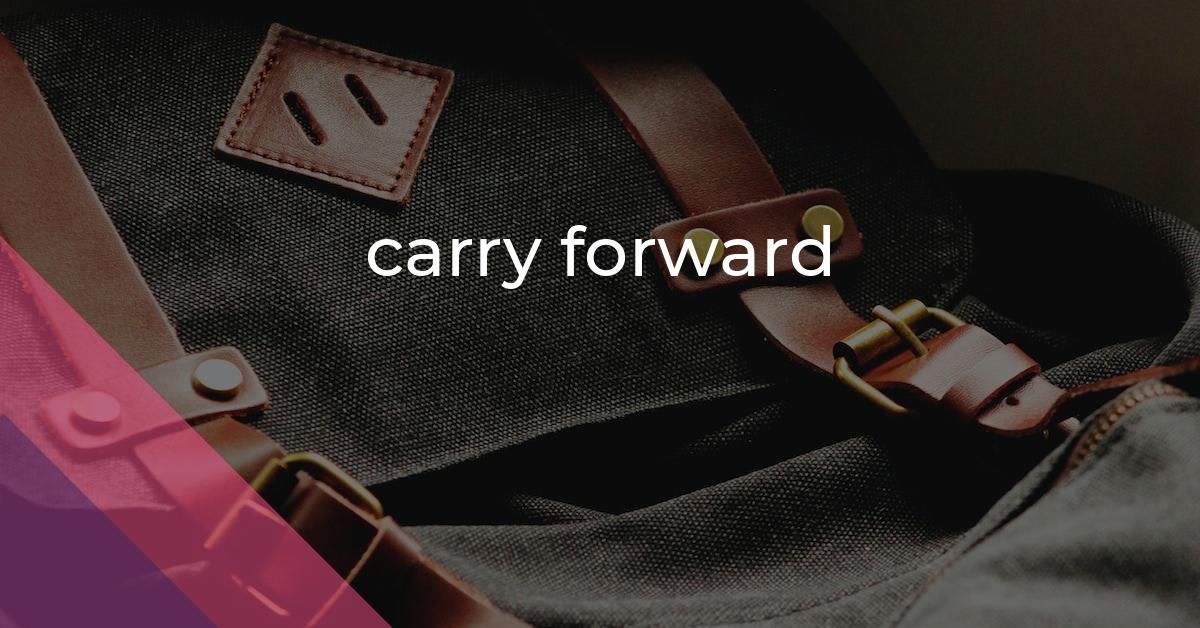carry forward: Idiom Meaning and Origin
What does ‘carry forward’ mean?
The idiom "carry forward" means to take or move something from one place or time to another, typically with the intention of making progress or continuing a task or plan.

Idiom Explorer
The idiom "keep the show on the road" means to continue with a task or activity without interruption or delay. It is often used to indicate the importance of maintaining progress or forward momentum to achieve a desired outcome or goal.
The idiom "keep the ball rolling" means to keep an activity or conversation going, to maintain progress or momentum in a situation. It suggests the idea of keeping things moving forward and not allowing them to come to a standstill.
The idiom "keep on trucking" means to persist or continue working hard despite difficulties or setbacks.
The idiom "keep on" means to continue doing something without stopping or to persist in doing something despite difficulties or obstacles.
The idiom "keep it up" means to continue doing something with the same effort and determination. It is often used to encourage or praise someone for their persistence or hard work.
"Keep it moving" means to continue forward or progress without stopping or getting distracted. It suggests maintaining a steady pace or momentum in order to achieve a goal or avoid wasting time.
The idiom "hold over" means to delay or postpone something. It can be used to describe the continuation of a person's term in office or the extension of a deadline or appointment.
The idiom "hand off" means to pass or transfer the responsibility or control of something to someone else.
The idiom "go through with" means to complete or follow through with a plan, action, or commitment despite difficulties or hesitations.
The Significance Unveiled
Carry forward is an idiom commonly used in English language. It has a figurative meaning that differs from its literal meaning. The idiom can be broken down into two separate words: carry and forward. Carry typically means holding or transporting something from one location to another, while forward signifies a direction that is ahead or in front of a person or object.
In its literal context, the term carry forward refers to physically moving or transporting an object in a forward direction. However, when used as an idiom, carry forward takes on a more metaphorical meaning. The idiom is often used to express the idea of continuing or progressing with a task or undertaking that originated from a previous point in time or situation. It is used to describe the act of taking something from the past or previous stage and continuing it further into the future or subsequent stage.
The idiom carry over is related to carry forward. Carry over is used to describe the act of taking something from one situation or time and bringing it into another. Similarly, carry forward involves the continuation of something from a previous point in time or situation. Both idioms emphasize the idea of bringing something from the past into the present or future for further use or development.
The idiom carry on is another related term. It is often used to describe the act of continuing or persisting with a particular action or behavior. While carry forward focuses on the continuation of a task or undertaking that originated from a previous point, carry on can encompass a wider range of activities or behaviors. However, both idioms convey the concept of persistence and not giving up on something.
carry through is another idiom that is related to carry forward. Carry through is used to describe the act of completing or following through with a particular task or plan. While carry forward emphasizes the continuity and progression of a task or undertaking from a previous point, carry through focuses on the completion or fulfillment of that task or plan. Both idioms highlight the importance of seeing something through to the end.
Lastly, there is the idiom carry off. Carry off is used to describe the act of successfully achieving or accomplishing something, often in a challenging or impressive manner. While carry forward is more about the continuation and progression of a task or undertaking, carry off focuses on the successful outcome or result of that task or undertaking. Both idioms convey the idea of achieving something and being successful in one's efforts.
The idiom carry forward is commonly used in various contexts, including business, finance, and planning. In the business realm, carry forward is often used to describe the practice of bringing forward unused resources or credits from one accounting period to the next. For example, a company may carry forward unused funds or tax credits from the previous financial year into the current one. This allows them to utilize these resources in the present, rather than losing them or starting from scratch.
In addition to its usage in the financial context, carry forward is also employed in the domain of planning and goal-setting. It can be used to indicate the act of taking unfinished or unaccomplished tasks or goals from a previous period and continuing to work on them in the future. This may involve carrying forward projects, objectives, or action plans from one phase to the next, ensuring continuity and progress.
The idiom carry forward can also have a broader metaphorical implication, extending beyond specific tasks, projects, or financial matters. It can convey the idea of building upon past experiences, knowledge, or achievements to propel oneself further in life. This implies carrying the lessons, skills, or successes from one situation or time to another, leveraging them to move forward and achieve greater things.
Overall, the idiom carry forward embodies the concepts of continuity, progression, and utilizing past resources or achievements in building a future. Whether in the realm of business or personal endeavors, carry forward serves as a reminder of the potential for growth and development by capitalizing on what has come before.
Example usage
Examples of how the idiom "carry forward" can be used in a sentence:
- She decided to carry forward her momentum from the previous project and apply it to the new one.
- The company has a policy to carry forward unused vacation days to the following year.
- He was able to carry forward his knowledge and skills from his previous job to the new position.
More "Usage" idioms



